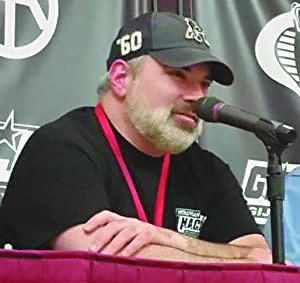Get fantasy and science fiction thrills and horror chills from Granite State authors
With everything from zombie apocalypses to high fantasy and futuristic concepts, the imaginations of the Granite State’s genre fiction writers are seemingly limitless. Katelyn Sahagian and Matt Ingersoll caught up with several New Hampshire-based fantasy, science fiction and horror authors to discuss their inspirations, influences and most recent projects.
Scott M. Baker
Before becoming a prolific self-published author of horror fiction, Scott Baker of Dunbarton worked for the Central Intelligence Agency for 23 years. Born and raised in Everett, Mass., he lived in Virginia during most of his tenure with the CIA, along with a few stints overseas.
While working for the CIA, he developed an idea for an espionage novel about North Korea acquiring five nuclear weapons. As Baker recalls, it was initially well-received — he even had a literary agent who was ready to sell the book to a major publisher in New York City — but then the Sept. 11 attacks changed everything.
“The minute 9/11 hit, everything dried up,” Baker said. “There was no market for espionage. … About three or four days afterward, my agent called me up and said the market died.”
A few years later, Baker said, he became inspired to switch genres from espionage to horror after seeing the 2004 film Van Helsing with a close friend.
“As we were walking out of the theater, I said, ‘You know, I could write a better story than that,’ and she looked me and smiled and said, ‘Well, why don’t you?’” Baker recalls. “So that’s what got me writing in the horror genre.”
His first three books made up The Vampire Hunters trilogy, followed up by The Rotter World trilogy, a series about a zombie apocalypse. He also became inspired by his then-10-year-old daughter to write a five-volume young adult series called Shattered World, about an ill-fated scientific experiment that causes portals to open between Hell and Earth.
Currently Baker is busy working on three separate additional series, including Book 9 of a planned 10-book series called Nurse Alissa vs. The Zombies.
“It’s about a typical nurse who is just your average person,” he said. “She’s working in the ER at Mass. General and she’s at Ground Zero during a zombie outbreak, so the whole series just deals with her getting out of Boston, trying to survive and picking up friends along the way.”
He also has a spin-off series set in the same universe, titled The Chronicles of Paul; the second volume was just released in October. A third series, meanwhile — known as The Tatyana Paranormal series — is about a young graduate student who discovers she has the ability to talk to spirits. The Ghosts of the Maria Doria, released last August, follows the titular protagonist as she finds herself stranded upon a haunted cruise ship.
While Baker most often dabbles in series, he does have a few standalone novels. One of his latest is Operation Majestic, released in December 2021.
“When people ask what that book is about, I say, ‘Think Indiana Jones meets Back to the Future, with aliens,” he said. “It’s a time-traveler [novel].”
All of Scott M. Baker’s novels are self-published. For more details on Baker’s work or to purchase an autographed copy of one of his books, visit scottmbakerauthor.blogspot.com or search for him on Amazon. You can also join his Facebook group, “Scott Baker’s Realm of Zombies, Monsters and the Paranormal,” or follow him on Instagram @scottmbakerwriter or on Twitter @vampire_hunters. Baker is one of several local writers who will attend the New England Author Expo’s Authors at the Vineyard event at Zorvino Vineyards (226 Main St., Sandown) on Sunday, Feb. 26, from 11 a.m. to 4 p.m. Admission to that event is free.
— Matt Ingersoll
Gregory Bastianelli
Some of Gregory Bastianelli’s earliest memories involved watching Creature Double Feature on Saturday afternoons around the age of 6. He first read the short stories of Ray Bradbury — whose 1962 novel Something Wicked This Way Comes is one of his all-time favorite books — before diving into the works of acclaimed horror writers such as Richard Matheson and Stephen King.
“I think I wrote my first short story when I was 11 years old, and then I just kept writing stories all the time,” said Bastianelli, a University of New Hampshire graduate and a native of Dover. “Pretty bad ones, but they were fun, and that’s how I sort of was cutting my teeth. … Another book that [had] a big influence on me when I was in junior high was Bram Stoker’s Dracula. I remember reading that and just being so moved and so terrified by it.”
Prior to publishing his first novel, Bastianelli lived in New York City, where he worked as a copy editor for a company that published law books. Returning to the Granite State at the end of the 1980s, he worked for Foster’s Daily Democrat as a copy editor and writer.
“Two of the highlights of my career were … getting to do an interview with Alice Cooper, who I was a big fan of, and then also interviewing Bruce Campbell. Anyone who knows horror knows Bruce Campbell — king of the B-movies.”
While working at Foster’s, Bastianelli published a few short stories in some obscure horror magazines. Through a contest, he finally found a publisher in 2011 for his debut novel, Jokers Club, a project he had been working on and off on for more than two decades.
“Before the contest ended, I got a call from the publisher and he said that, regardless of how it did in the contest, he wanted to publish it. I was just thrilled,” Bastianelli said. “It did end up winning second place in the contest, but the fact that he reached out to me and said that he was interested in publishing, it was a dream come true.”
Since then Bastianelli has moved on to a larger publishing company, Flame Tree Press, out of London, England. In January 2020 he released Snowball, a novel about a group of motorists who are stranded on a New Hampshire highway in the middle of a blizzard on Christmas Eve. His latest title, Shadow Flicker, was published in March 2022.
“Shadow Flicker is about an insurance investigator who goes to an island off the coasts of Maine to interview some residents … who are complaining about some wind turbines, believing that they cause some ill effects,” he said. “In the course of his investigation, he stumbles upon something even darker going on on this island, and he gets sucked into a phenomenon that is beyond anything that he could realize.”
Bastianelli called Snowball a “straight-out horror novel.” Shadow Flicker, on the other hand, has been referred to by some as horror and others as a science fiction or speculative mystery.
Bastianelli is a regular participant in speculative fiction writers’ conventions like NECON in Lowell, Mass., in July. He has also attended StokerCon, put on by the Horror Writers Association, and the Merrimack Valley Halloween Book Festival, held in October in Haverhill, Mass.
“One of the things that I’ve learned from going to a lot of these conventions and events is that … a lot of these authors that you grew up loving, they love to hear that you talk about their books and that you enjoy their writing,” he said. “That’s what they do it for.”
Gregory Bastianelli’s latest novel, Shadow Flicker, is available through Flame Tree Press (flametreepress.com). Learn more about Bastianelli and his works by visiting gregorybastianelli.com, which provides links to various ways to purchase his books. You can also find him on Facebook and Twitter, or purchase his books online through Amazon or Barnes & Noble.
— Matt Ingersoll
Justin Bell
While most authors jump from subject to subject in the same genre, Justin Bell takes a much different approach. His writing is specifically in the post-apocalyptic subgenre, which focuses on what happens to humanity after a catastrophic event.
For example, the series Bell just finished writing focused on what would happen if the world became too radioactive for humans to survive above ground.
Bell started his writing career by working for a handful of different independent publishing houses, gravitating toward the post-apocalyptic subgenre the whole time. When he was picked up by his current publishing house, Muonic Press, he got the chance to shine.
Muonic, Bell said, exclusively publishes post-apocalyptic science fiction, and on top of that, the company is one of most-read publishers for the subgenre on Amazon. Bell saw a drastic increase in readership, he said.
His books get millions of reads a year, averaging between 12 million and 15 million. He said one year during the pandemic his page reads was up to 20 million.
“It’s amazing,” Bell said. “I was a struggling author independently published. I started in 2014 with middling success and exposure. … Later in 2018 I’m getting hundreds of pre-orders per book and it’s been life-changing.”
Bell said he just completed his most recent book series in June 2022, and a collection of the six-book series dropped in November. Now he’s putting all his efforts into his new novel series, After the Fall, with the first novel coming on Feb. 3, and a new book coming monthly after that.
Bell said that he’ll continue writing post-apocalyptic stories for as long as the subject remains interesting to him and inspires him with different ideas. His favorite part of the subgenre isn’t the disasters and chaos but the resilience of the characters thrown into those situations. To him — and his readers — it becomes a story of the human spirit and of hope.
“What’s great about these books is you’re putting [characters] through different situations but seeing, in spite of odds, that they persevere,” Bell said. “They find a light in the darkness and that’s what I like most about them.”
Visit Justin Bell’s website at justinbellauthor.com to learn more about his works, which are available through Amazon and its products Kindle and Audible. All of his works are published by Muonic Press. To learn more about Muonic Press, visit their website at muonic.com.
— Katelyn Sahagian
David D’Amico
David D’Amico grew up with a love of writing. He said that when he was young he always had story ideas floating around in his head. It wasn’t until his twin brother announced he would be a writer that D’Amico decided to take up the craft as well.
“All my life I was the one with the stories,” D’Amico said, jokingly adding that he “couldn’t let [my twin] become the writer.”
D’Amico has won numerous awards for his science fiction short stories, including winning Writers of the Future in 2011. His stories have been published in popular science fiction magazines, including Analog. While his stories are typically around 5,000 words, he said that it’s become enough space for him to get a good grasp on his storytelling abilities.
Typically, when writing a story, D’Amico finds it much more important to focus on the characters than the world that he’s built for each story. He said that character studies are better received by publishers and readers.
“I write majoritively straight sci-fi, slightly in the future, a little bit like The Twilight Zone,” D’Amico said. “I’m heavy on characters, and it’s not epic quests, usually.”
Right now D’Amico is working on publishing collections of his stories, called “Through Machine Eyes,” which are illustrated through an artificial intelligence art program. Two have already been published, and he hopes to put out more in the new year.
Even this early in the new year D’Amico has sold one of his short stories. He said that he’ll sell approximately a dozen over the course of 2023, depending on the process. Some of his stories can be as short as 42 words long, but he prefers a bit more length to establish context.
In addition to submitting his short stories to different magazines and working on his AI project, D’Amico is working on completing his first full-length novel. He said that he’s begun several but wants to really stick to it this year.
D’Amico has learned over the years that writing isn’t just a career, it’s a passion. To him, readers can tell when authors aren’t happy writing, and that is the most important part of the craft.
“Write what you like,” he said. “Enjoy it. Don’t worry about the other stuff until after the draft is done.”
For more information about David D’Amico, or to read his short stories and purchase a copy of his anthologies, visit his website at dadamico.com. His second anthology of stories Through Machine Eyes: Science Fiction and Fantasy Stories Illustrated by AI Intelligence, Volume Two was a self published title.
— Katelyn Sahagian
Elaine Isaak
Fantasy steeped in real history is what Elaine Isaak’s writing is all about. She strives for a level of realism in her work, tying archaeology to magic, and adding a fantastical element to history.
“My author brand is knowledge-inspired fiction,” Isaak said. “I find ideas by reading nonfiction or doing museum visits [about] something that excites and inspires me.”
Isaak said that binding her love for history and art with her writing has been one of the best things that has ever happened to her. Her novels will take something like an obscure medieval clock and turn it into a doomsday device the protagonist must find a way to stop, as in her most recent novel.
While she primarily writes fantasy novels, Isaak is exploring new territories with her upcoming young adult sci-fi series about space dragons, the first book of which is set to be released on Feb. 7.
The series was written for her son, who she said loves robots and dragons, and she wanted to find a way to combine the two. She got the idea when another writer mentioned doing the same for their child.
“I didn’t want it to be fantastical dragons,” Isaak said, explaining her reasoning for choosing a sci-fi approach to traditionally fantasy creatures. “I thought, if they’re not fantasy and those tropes, then they’re probably aliens.”
She’s taking her research-forward approach of writing to this genre too, looking at how some animals communicate non-verbally. One inspiration she mentioned was learning that elephants use the vibrations from their footfalls to communicate across miles. Another is looking at animals like dolphins and platypuses that have electroreceptors that give them the ability to sense their prey underwater.
Isaak said that she wanted the series to make people think about what communication and culture are, and what it would look like in aliens wildly different from humans, as well as planets different from Earth. She said the most important thing she can do with her books is create a world her readers can enjoy, one that sparks their own imagination.
“A work isn’t complete until there’s a reader,” Isaak said. “[Books are] a collaboration between me and my words and the reader opening their imagination to the world and characters I’m creating.”
To learn more about Elaine Isaak’s work, visit elaineisaak.com. Her most recent work, Drakemaster (written under the pen name EC Ambrose) was published by Guardbridge Books. Her novels are available online at Amazon and wherever books are sold.
— Katelyn Sahagian
Troy Osgood
Building imaginative worlds is only one aspect of Troy Osgood’s writing. He creates worlds within worlds, choosing to use video games to trap his characters in alternate realities. He likes the diversity this allows him, bringing fantasy and sci-fi together.
One of his most recently completed book series, Sky Realms Online, follows this almost exactly. He said the plot is about a popular online virtual reality video game that sucks in some of the players. The players have to navigate the world of floating islands held together by magic and defeat boss battles and quests, all while trying to figure out how to escape the game.
“I want to write adventures and entertaining stories that people want to read more of,” Osgood said.
Sky Realms Online was completed last November, followed by the completion of a similar saga with fewer fantasy elements called Battlegrounds Online — the final book in that series was released in December.
His next series, Connective System, will be a bit different. Instead of characters being sucked into the games they’re playing, a game will “hack” the world, giving humans superpowers and special abilities. Osgood said the story will fit more in with the post-apocalyptic subgenre of science fiction.
“They’ll have to rebuild their world with superhuman powers,” he said, adding that he plans to release the first in the series in either March or April.
While Osgood’s more adult books focus on the sci-fi worlds of being trapped in video games, or video games affecting the outside world, his books for younger readers are more steeped in the fantasy genre. He just finished writing a series called The Viral Rose Sprite, and he hopes to get more young reader fantasy out in the coming year.
“You can get away with a lot more stuff,” Osgood said about his fantasy writing. “As long as your magic rules make sense, anything goes. You can have a lot of fun and just go crazy.”
To learn more about Troy Osgood’s writing, visit ossywrites.wordpress.com. His books, (print, e-edition, and audio) can be purchased at Amazon. His most recent book, Onyxgate, was published by Aethon Books.
— Katelyn Sahagian
Chris Philbrook
While Chris Philbrook’s books will almost always have a science fiction or fantasy base to them, he likes to tie them to thriller and horror tropes as well.
“I got my big break with post-apocalyptic, so where horror and science fiction meet,” Philbrook said. “I’ve written urban fantasy, too. I tend to gravitate toward horror themes. I like having characters meandering into places where they are stressed out by situations and given the chance to rise up or succumb.”
His most recent novel, Ghosts, is the 13th in the Adrian’s Undead Diary series, released last Halloween. The series follows Adrian as he tries to reunite the dead and help their souls move on. Philbrook said he wasn’t sure how long the series would continue, but he started it back in 2010 and people have seemed to really enjoy it.
Philbrook is currently working on both the 14th volume of Adrian’s Undead Diary and the third book in The Darkness of Diggory Finch series. Right now, he doesn’t have a concrete publishing date for either book, but is aiming for the spring for Adrian’s Undead Diary and the summer for The Darkness of Diggory Finch.
The Darkness of Diggory Finch series is cosmic horror set in the woodland border of New Hampshire and Vermont. The main character, Diggory Finch, finds himself inheriting land at the border, and once he moves there he finds out that nothing is as it seems.
“The series is [Diggory Finch] dealing with the locals and [figuring] out what the deal with his family is,” Philbrook said, adding that there are twists and turns, like cults and “monsters and bears and weirdos, oh my.”
Philbrook said that most of his inspiration for writing comes from living in the Granite State. Although he has lived in Boston and Arkansas and has traveled across the country promoting his novels, Philbrook said there is something special about living and writing in New Hampshire.
“It’s a neat place to be a writer,” he said. “New Hampshire is a cool nexus of culture and location that isn’t very common in America.”
Find information about Chris Philbrook’s upcoming books at thechrisphilbrook.com. His works can be purchased online at Amazon, but Philbrook would love for his readers to support independent book shops by ordering his books through them. His most recent book, Ghosts, was self-published.
— Katelyn Sahagian
Jeremy Robinson
It takes a lot of effort to create one world for a book or series to take place in, but Jeremy Robinson decided that just one world wasn’t enough. His 80 books take place in something he calls the Infinite Timeline, a multiverse that existed long before the Marvel Cinematic Universe.
“Readers have tried making a map of how all 80 books are connected,” Robinson said. “It’s fun for me and it’s fun for the readers as well.”
Robinson said most of his novels could be read as stand-alone books. He said the only thing that stays the same for some of the books is that they will feature the same characters. His most recent publication, Khaos, blends Greek mythology with the science fiction world he’s built.
The next book after Khaos will be called Singularity, which will be coming out on March 21. Robinson said that Singularity will officially tie the whole universe together.
Due to his extensive catalog of work, Robinson has amassed a large following across the country. He’s been a New York Times bestselling author and the No. 1 bestselling author on Audible. He’s even had people in Texas host a “Robinson Con,” a convention to discuss and enjoy the books he’s put out over the years.
Robinson gained popularity because of his skill with the subgenre called creature features, where monsters are the star of the show. He said he strives to make his books interesting to all readers, and interesting to write, by making the plot get increasingly strange.
“It’s probably that I’m ADHD and, for me to write, [the stories] have to get progressively weirder to hold my own attention,” Robinson said. “I start with real science and then I get to go crazy.”
His favorite creature that he’s created is called Nemesis, a kaiju that spawns out of different New Hampshire locations and destroys Boston. Robinson said he’s working on Nemesis Wages of Sin, a reboot of his original series that featured Nemesis, called Project Nemesis, and hopes for it to come out sometime in 2023.
The book will be written in conjunction with a television show that Sony is producing about the first book. Robinson said he feels fortunate to have had all these opportunities for his writing.
To keep track of Jeremy Robinson’s upcoming projects, visit his website bewareofmonsters.com. Robinson’s books can be purchased online or from local bookstores. His most recent book, Khaos, was published by Breakneck Media.
— Katelyn Sahagian
Tony Tremblay
Tony Tremblay’s lifelong love of horror started when he was around the age of 9 or 10, reading, of all things, the Old Testament of the Bible.
“Those stories were scary as heck, and they left a lasting impression on me,” said Tremblay, a longtime resident of Goffstown. “As I grew older I started to look at some of the horror authors that were out there at the time, and really enjoyed what I was reading. … I thought maybe I could try to write something on my own, but just never got around to doing it.”
About 15 years ago, at the encouragement of a colleague, Tremblay joined a writers’ group at his local library, which helped him learn all of the fundamentals of how to write fiction.
“My first stories were horrible. But I learned fast and I started getting stories published in anthologies and websites and magazines,” he said. “The writers’ group helped me tremendously.”
Tremblay published his first book of short stories, The Seeds of Nightmares, about a decade ago through Crossroad Press. His latest work — 2022’s Do Not Weep for Me, available through Haverhill House Publishing — is a follow up to The Moore House, which was nominated for a Bram Stoker Award in 2018 for “Best First Novel.”
“Bram Stoker, of course, is like the Oscars of the horror industry, and I couldn’t be prouder,” he said. “It was a great honor.”
Both novels are set in the same universe and deal heavily with the macabre side of religion. The Moore House in particular, he said, has been compared by many to the 1971 novel The Exorcist.
“All the action happens in Goffstown, so if you’re a Manchester or a Goffstown resident, you’ll see all the familiar sites in there, [like] the bridge downtown, the popcorn stand and all that stuff,” Tremblay said. “So that’s a lot of fun for the local people.”
While reading The Moore House first is not necessary to enjoy Do Not Weep for Me, Tremblay said it absolutely does make the experience “more fun.”
“Both of them are very fast reads,” he said. “I’ve had people write to me, [saying] they’re on airplanes and they didn’t want the flight to end because they wanted to finish the book. It’s that thrilling, and that’s what I was trying to write.”
Tremblay said he hopes to complete his next novel by Halloween, and he also has a new novella and a new short story in the works for later this year. Throughout the year, he participates in regional conventions alongside many other names in horror fiction. He even has co-produced one in Manchester, known as NoCon, which has been on hold since the pandemic.
“I’ve read thousands of books, and what’s kind of neat is that now I’m the one that’s selling them and going to these conventions and speaking on the panels,” Tremblay said. “If you asked me if that would ever happen, I would’ve laughed in your face back then. But it just proves that anybody can do it. You just have to buckle down and learn.”
Tony Tremblay’s latest novel, Do Not Weep for Me, is available through Twisted Publishing, an imprint of Haverhill House Publishing (haverhillhouse.com). Find out more about Tremblay’s work by visiting tonytremblayauthor.com. You can also find him on Facebook or purchase his books online through Amazon or Barnes & Noble.
–Matt Ingersoll
Featured photo: It came from NH




























